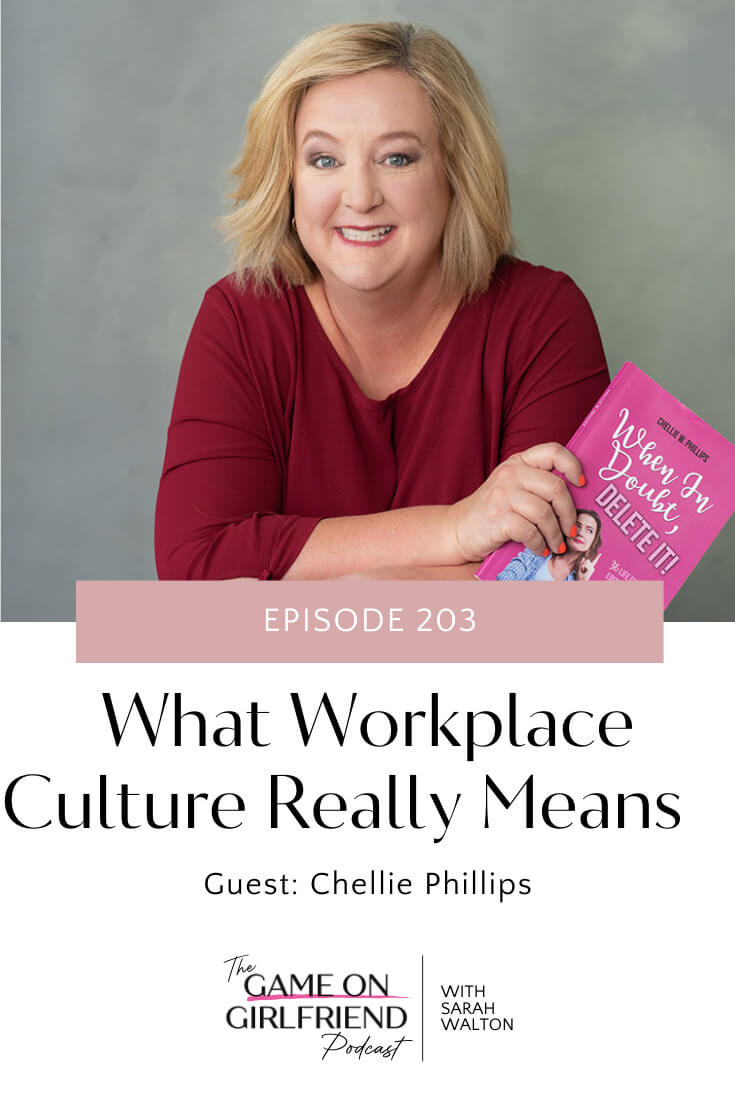Episode 203: What Workplace Culture Really Means with Chellie Phillips

Workplace culture is the difference in whether people want to work for you, whether they want to buy from you, the kind of experiences that they have, and whether they stay with you over the long term.
Chellie Phillips has cracked the code with her Successfully Ever After program meant to make you irresistible in the workforce – whether you’re looking for an ideal career, or you want to create a culture where employees thrive.
‘Culture Secrets’ to improve your workplace
Chellie’s third book is called “Culture Secrets” and it provides advice for leaders looking to build a value culture in their workplace. In doing the research, Chellie found what works with culture falls into five buckets and came up with this acronym:
Value and Vision
Accountability
Leadership
Unique people (you)
Engagement
Chellie says that what makes people want to show up at work and stay where they are is when they feel like they belong and they contribute to the success of an organization. Culture is what creates that sense of belonging and value that someone feels inside that organization. Work for you when you're not there. If the copy is garbage or sounds like everyone else, it won't work.
Creating a business or being involved in a business where the company culture is clear is critical. It is a human need that we have to feel safe, to feel like we belong, to feel like what we're working on matters, and to feel like our voice inside that work matters.
People centered culture
People are at the center of all of our worlds. When you start looking at the basic human needs beyond shelter and clothing, belonging is what makes our community strong. It’s what makes us want to be involved.
You can walk into a place and feel whether people enjoy being there. As a business owner, you know how much that feeling impacts how people recommend you to others.
For example, if you go to a restaurant and have a lousy experience – maybe the waitstaff is not up to par. They’re grumbling about their hours, or they’re on their phone not paying attention to the customers. They hand you a check and have a “get out now” attitude. You’re probably not going to recommend that restaurant.
But if you create an experience by making people feel like they belong, that they have a voice, that they're contributing to what's going on, and that their values as people align with your values as an organization, you'll set yourself up for success. You're going to have long-term employees that your customers love to interact with and are going to refer you -- your service, your product, whatever it is -- to someone else, because they want them to have great experiences too. It really is a win-win for the business and the employee.
Leadership qualities for positive workplace culture
If you want people to feel like they belong, the first thing that Chellie says leaders need to do is shut up and listen. Leaders talk a lot. You're always in meetings. You're always doing something. You're putting out information. You're trying to make sure processes are happening. You're trying to make sure reports are getting done. You're out in the community.
Sometimes, we need to stop and take a step back. We need to really listen to the people who are at the heart of the organization. Who's the meat of this that's getting it done for us day in and day out? That’s why Chellie thinks the best thing that leaders can do is actually listen better and engage with the people on their team.
Acknowledge the fact that we all have other things happening other than what's going on in our jobs, and we all bring that to work with us, whether it's good, whether it's bad. Having those conversations makes your team more willing to have harder conversations with you when they need to.
Everybody is resistant to change. But if they feel like you, as that leader, have listened to them, that you have their back, they're less resistant to that change. They're more likely to give it a try and at least make a go of it than if you're just throwing something new at somebody who feels like the only time you engage with them is at their twice a year evaluation.
It goes back to that people centered approach, where they feel like you as a person matters to them.
Culture and understanding your value
Chellie’s journey started with a bad boss, who came after a boss she’d loved for years retired. She felt devalued. She felt like her skills weren't appreciated anymore. She felt like she didn't have a seat at the table or that someone wasn't recognizing what she could add to the organization anymore.
After 20 years being with that organization, it was kind of that kick in the pants moment where she had to ask, “do I stay here? Do I make that move? Do I have the courage to see what else is out there and take that opportunity?”
She also worked with a sorority where she saw women graduate and take “get-by jobs.” Months later, when offer letters started rolling in, they were coming in $5,000 to $8,000 less than their peers who received an offer on graduation.
She says it’s important for young professionals to research what a position in the field is actually worth. Understanding what skills are being valued at in today’s marketplace grants confidence in what we bring to the table and how we’re adding to the success of an organization.
The same is true of people running a business. Many entrepreneurs go years without raising their prices to current market rates. And your entry-point salary is critical because all your future raises will be built upon it.
“It really solidified in my mind, you know, that we are our best assets and no one's going to pay you what you think you're worth, only what they think you're worth. And so it's up to us to be able to control that narrative and set ourselves up for the best fit for whatever that career is that we want to be,” says Chellie.
Free gift for listeners
Be sure to get Chellie's free E-book for starting a culture movement in your office




